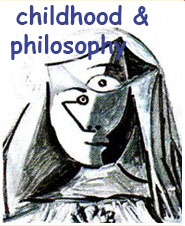diseñar un espacio para voces reflexivas. relacionar el ethos del zine con la indagación filosófica dirigida por jóvenes
DOI:
https://doi.org/10.12957/childphilo.2016.26352Abstract
This article strives to lay some necessary theoretical groundwork for justifying an alliance between zining and youth-driven philosophical inquiry—two important practices that operate outside the mainstream yet can shed light on conventional (mis)understandings of youth by illustrating innovative ways of designing space for young voices to emerge and thrive in their educational experiences and beyond. By highlighting the shared ethos between zining and the Community of Philosophical Inquiry as practices that foster meaning-making, this article aims to emphasize their common participatory, do-it-yourself, experimental, politicizing and transformative features, while noting the challenges involved in extending them to the context of childhood. Further, it illustrates how aligning zining and philosophical inquiry can contribute to a re-envisioning of children by portraying them as capable cultural producers and social historians of their own discourse communities. Lastly, it explores issues of adult authority, suggesting conditions that may help to authenticate the philosophical use of zines with youth within the CPI model and provide great advantages to youth, including increased access to multiple ways of learning through interdisciplinary projects, more equalized relationships with adults, a range of creative and thinking dispositions that can enhance their self-efficacy, and a genuine sense that their voices matter. It argues that as ambassadors for voice, zining and philosophical inquiry have much to teach one another, especially with regard to depicting youth as capable, considerate thinkers with ideas worth sharing.Downloads
I dati di download non sono ancora disponibili.
Downloads
Pubblicato
2016-11-17
Fascicolo
Sezione
articles



